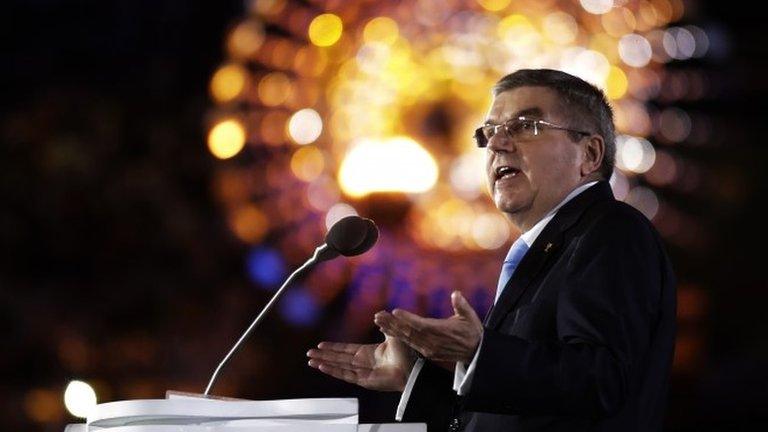TUE system can be abused by athletes - Dr Richard McLaren
- Published
Richard McLaren critical of IOC's doping report response
The system of therapeutic use exemptions for athletes is open to abuse, says the man who led the probe into Russia's state-sponsored doping.
Hackers Fancy Bears this week released athletes' stolen TUE medical files.
Asked if the files raised concerns, Dr Richard McLaren said: "Probably, yes. It would depend which sport."
British Olympic champions Laura Trott and Nicola Adams had files released on Friday, although there is no suggestion they are involved in any wrongdoing.
UK Anti-Doping chief executive, Nicole Sapstead said: "We absolutely condemn the latest release of personal information.
"The use of TUEs is not a doping offence, and all of these athletes have legitimately applied for, and been granted, medical support within the anti-doping rules."
Russia president Vladimir Putin said that he "did not support what the hackers have been doing", but suggested the leaks "raised many questions".
His comments came after International Olympic Committee (IOC) president Thomas Bach said he will ask Moscow for help to stop the hackers, who the World Anti-Doping Agency (Wada) believes are linked to Russia.
'TUEs are open to abuse'
The records released mostly detail TUEs, which allow banned substances to be taken for athletes' verified medical needs.
Canadian law professor and sports lawyer McLaren told BBC World Service: "One would have to conduct investigations on specific sports as to whether or not too many TUEs are being used with respect to particular substances.
"One of the common TUEs is for ADHD medication - there may be abuse there.
"That's one area that probably needs to be looked at - how frequently are [certain medicines] being used in particular sports?
Methylphenidate, for example, is a stimulant that helps improve brain function in people with ADHD, but it could also help improve an athlete's performance and is only allowed to be used by elite performers with medical approval.
'IOC response turned my report on its head'
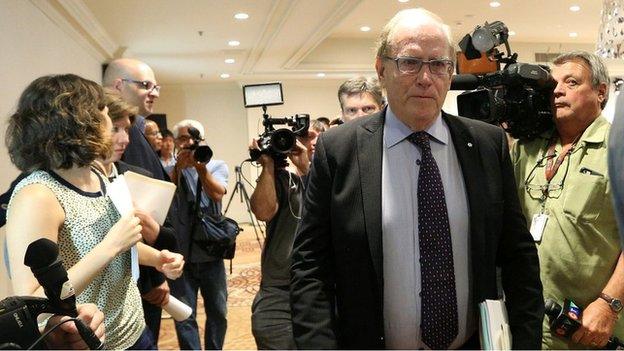
Dr Richard McLaren published his Wada report into Russia's state-sponsored doping in July
McLaren also questioned the IOC response to his Russian state-sponsored doping investigation, which is believed to have prompted the hackers to break into Wada's systems and release the athletes' files.
He said the IOC downplayed the findings of his report, which concluded that Russia's sports ministry "directed, controlled and oversaw" manipulation of urine samples provided by its athletes between 2011 and 2015.
The IOC imposed a partial ban on Russian athletes competing in the 2016 Olympics, in contrast to the International Paralympic Committee, which imposed a blanket ban on Russian participation at the Paralympics.
"The IOC turned it into an issue about individuals," he said.
"The report looked at individuals not because they had committed doping infractions, but [to ascertain] whether they were part of a system that was operated outside of their national governing body, and was being run by the state."
He said he was "confident" the report found sufficient proof of Russian state-sponsored doping, "beyond a reasonable doubt".
"They were not interim conclusions," he added. "They were final conclusions, and not allegations, as was suggested by various organisations including the IOC.
"The decision by the IOC [to impose a ban only on individual Russian athletes guilty of doping offences in the past] turned that on its head and turned it into an issue about individuals and their rights to compete, which was nothing to do with the report."
What are therapeutic use exemptions?
A TUE allows an athlete, for medical reasons, to take a prescribed substance or undergo treatment which is prohibited.
British athletes must contact their national governing body or follow UK Anti-Doping (Ukad) guidance, external before applying for a TUE.
There are strict criteria for one to be granted:
The athlete would suffer significant health problems without taking the substance;
It would not be significantly performance-enhancing;
There is no reasonable therapeutic alternative to its use;
The need to use it is not due to prior use without a TUE.
Ukad says it has "a number of robust controls in place to make it as difficult as possible" for athletes to misuse the system.
Why are we talking about TUEs?
Three-time Tour de France champion Chris Froome and five-time Olympic gold medallist Bradley Wiggins were among five British athletes to have their files released earlier this week., external
The medical files of golfer Charley Hull, rugby sevens player Heather Fisher and rower Sam Townsend were also made public.
Froome, 31, said he had already made public his use of TUEs.
Froome twice took the steroid prednisolone for "exacerbated asthma" while Wiggins used salbutamol to treat chest conditions and asthma.
Medical details for swimmer Siobhan-Marie O'Connor and rower Olivia Carnegie-Brown, who both won silver medals for Team GB in Rio, were published along with Trott and Adams on Friday.
Four-time Olympic cycling champion Trott had TUEs for salmeterol and salbutamol, which are used in the treatment of asthma and expired on 31 July, 2013.
Her spokesman said: "It's well known that Laura has suffered from asthma from an early age and inhalers are part of most asthmatics' lives.
"It's disappointing that her medical records have been put on the internet but asthma is something she's always been happy to discuss."
Wada director general Olivier Niggli has strongly criticised the leak.
Froome, speaking during the 2015 Tour de France, questioned critics
- Published15 September 2016

- Attribution
- Published15 September 2016
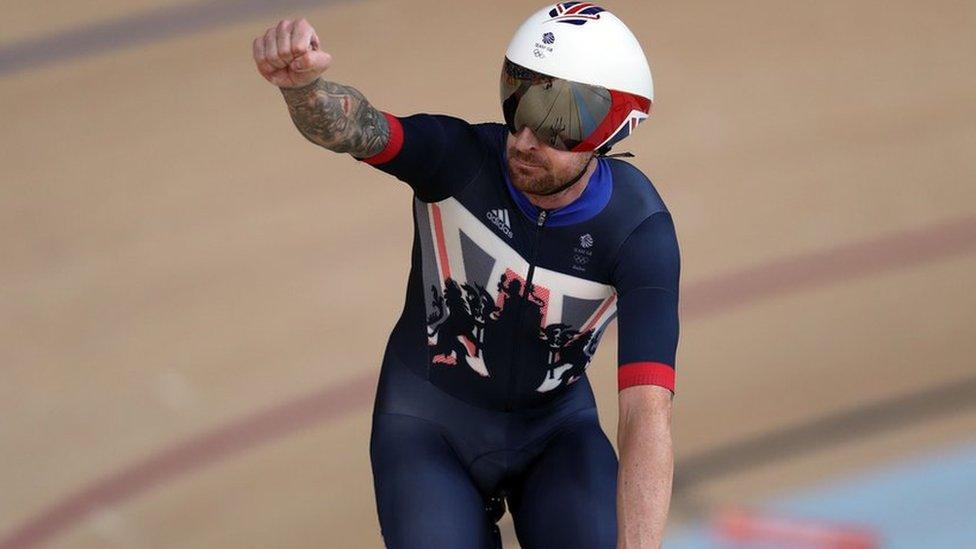
- Attribution
- Published10 September 2016
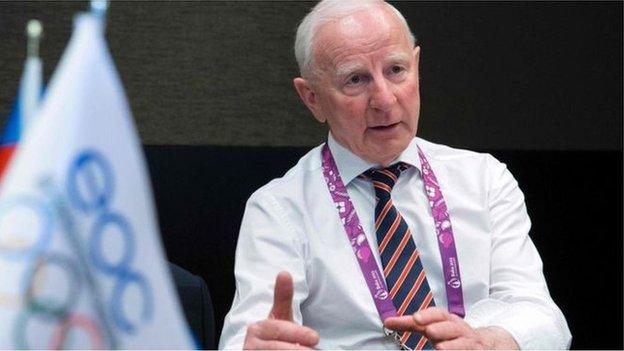
- Published8 August 2016
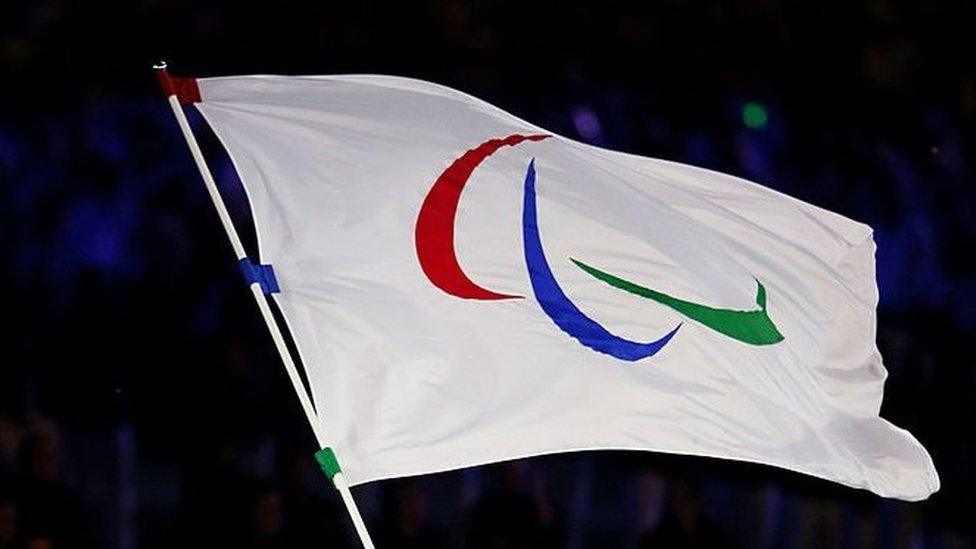
- Published19 July 2016

- Attribution
- Published9 September 2016
